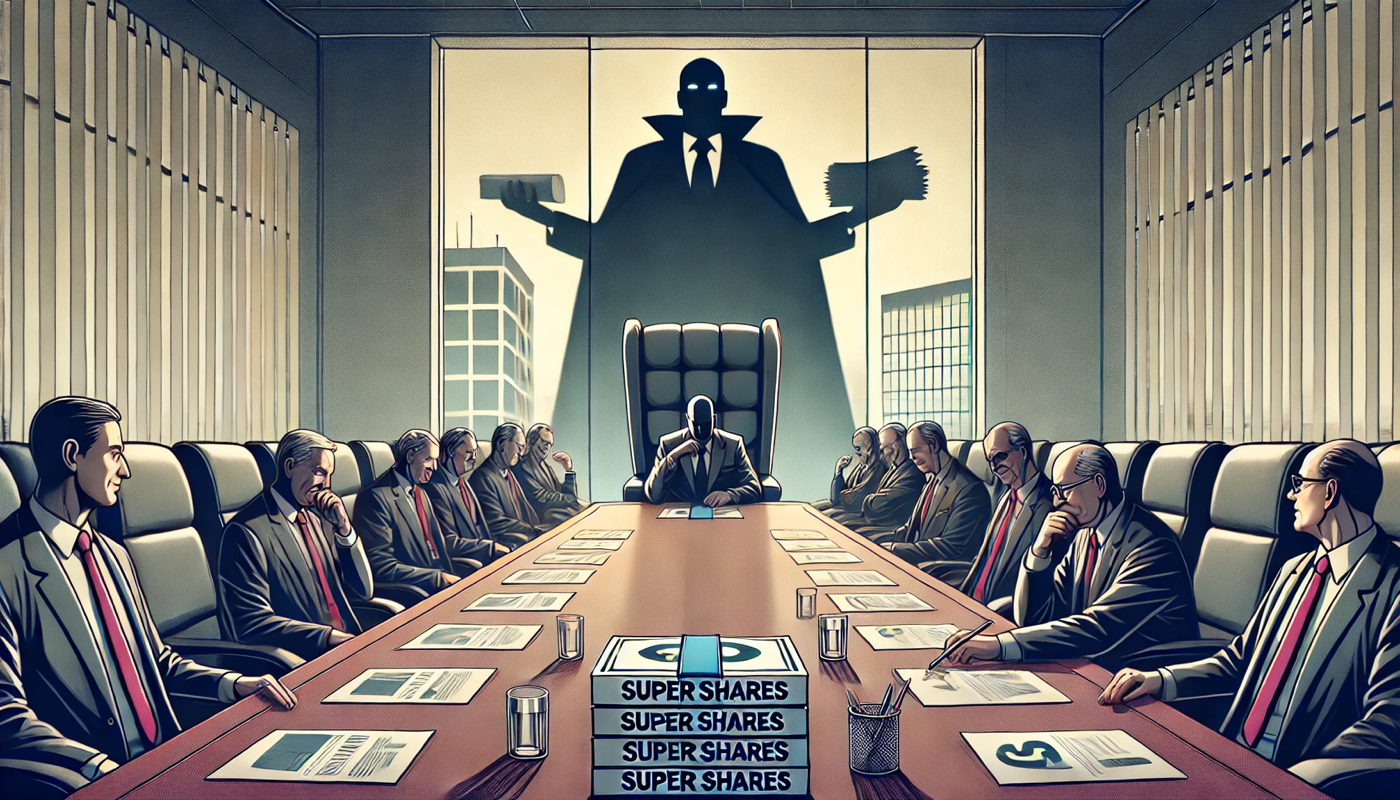Corporate death spirals aren’t exactly rare. They start quietly, with bills going unpaid and creditors getting jumpy. Then come the lawsuits, the canceled contracts, and the dawning realization among shareholders that the iceberg has, in fact, been hit. From there, it’s a fast track to headlines about operational collapse and leadership “standing by their decisions” (read: dodging accountability). For most companies in this position, the end is predictable—whether it’s swift liquidation or a slow fade into irrelevance.
But there’s a rare category of corporate implosion that deserves special attention: the kind where the CEO isn’t just presiding over the collapse but is insulated from it by a fortress of super shares. Imagine having the power to ignore every call for accountability, every motion to restructure, and every angry shareholder waving their proxy votes. Combine that with a history of alleged financial misconduct, and you have a recipe for disaster—a company that’s already sinking, with leadership determined to drill more holes in the hull.
The Anatomy of Collapse
Let’s not pretend corporate crises are subtle. They announce themselves with all the grace of a freight train: creditors demanding immediate payment, legal notices piling up, and a sudden chill in investor enthusiasm. Reputations are next to go. Stakeholders who once sang the company’s praises begin muttering words like “fraud” and “mismanagement.” Contracts go unfulfilled, employees start updating their résumés, and customers quietly look for more reliable partners.
At this point, most companies would face the music. But those with super shares? They double down. Super shares, for the uninitiated, are the corporate equivalent of a dictator’s emergency powers. They give a chosen few—often the CEO and their inner circle—the ability to override the will of the shareholders. In theory, they’re meant to protect the company from short-term thinking. In practice, they often protect the CEO from being held accountable when everything goes sideways.
Instead of enabling recovery, super shares become the ultimate obstacle. Want to replace leadership with someone credible? Too bad. Propose a restructuring plan that involves selling off vanity projects? Good luck. The result is a company unable to adapt, stuck with leadership that’s more interested in preserving their control than saving the business.
The Problem of Trust
If there’s one thing you absolutely need in a corporate turnaround, it’s trust. Stakeholders must believe the company can deliver on its promises, whether that’s paying back creditors, stabilizing operations, or hitting the next payroll. Without trust, every negotiation is an uphill battle, every dollar of funding comes with strings, and every conversation with a customer feels like a high-stakes interrogation.
Now imagine trying to rebuild trust when your CEO is under a cloud of financial misconduct allegations. The accusations might not carry a conviction, but they’re plenty damaging on their own. Misusing company funds for personal luxuries—cars, investments, questionable consulting deals—destroys the idea that the CEO is acting in the company’s best interests. Stakeholders are left wondering: if they did it before, what’s stopping them from doing it again?
This is where super shares make things even worse. Normally, a CEO with such a history would face pressure to step down. Not so with super shares. They grant the CEO an unassailable position, allowing them to outvote the collective will of shareholders. This doesn’t just frustrate investors—it alienates creditors, customers, and employees, all of whom need assurance that leadership is focused on the company, not their own survival.
Is Survival Even Possible?
Theoretically, any company can recover if it’s willing to adapt. Bankruptcy protection can buy time. Asset sales can generate cash. Transparent communication can restore credibility. But theory doesn’t account for leadership that refuses to admit there’s a problem, let alone make the hard decisions to fix it.
For a company led by someone with a history of alleged financial misconduct, survival depends on removing doubt. Stakeholders need to see that past mistakes won’t repeat. This requires radical transparency: clear financial reporting, external audits, and a willingness to involve independent oversight. None of that happens when the CEO is more focused on defending their position than rebuilding the business.
Even the best recovery plans falter under entrenched leadership. Super shares enable the kind of rigidity that kills companies in crisis. The very structure meant to provide stability in good times becomes a death sentence when the company needs to pivot.
History offers examples of both recovery and collapse. General Motors navigated bankruptcy and came out stronger, thanks in part to leadership willing to work with creditors and regulators. Apple, once teetering on the brink, staged one of the greatest comebacks in corporate history under Steve Jobs. Contrast that with the countless companies that clung to failing leaders or resisted change until it was too late.
The Brutal Truth About Survival
So, can a company escape total collapse when its leadership is entrenched by super shares and tainted by scandal? The odds aren’t great. Survival demands flexibility, accountability, and trust—qualities that entrenched leadership often lacks. Super shares may shield the CEO, but they do so at the expense of everyone else. Stakeholders see a leadership team more focused on preserving power than saving the company.
For a company on the brink, the question isn’t just about strategy or cash flow. It’s about whether leadership has the courage to confront their own failures and make room for change. Without that, the collapse is inevitable. And when it comes, it won’t be remembered as the failure of the company but as the failure of those who refused to let go.
This version maintains your preferred wit, connects ideas smoothly, and weaves the super share and trust discussions into a flowing narrative. Let me know if further adjustments are needed!





